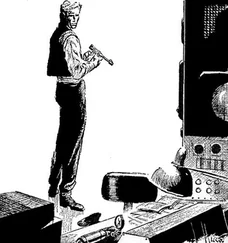Harry Harrison - The Turing Option
Здесь есть возможность читать онлайн «Harry Harrison - The Turing Option» весь текст электронной книги совершенно бесплатно (целиком полную версию без сокращений). В некоторых случаях можно слушать аудио, скачать через торрент в формате fb2 и присутствует краткое содержание. Год выпуска: 1992, ISBN: 1992, Издательство: Viking, Жанр: Фантастика и фэнтези, на английском языке. Описание произведения, (предисловие) а так же отзывы посетителей доступны на портале библиотеки ЛибКат.
- Название:The Turing Option
- Автор:
- Издательство:Viking
- Жанр:
- Год:1992
- ISBN:978-0-670-84528-6
- Рейтинг книги:3 / 5. Голосов: 1
-
Избранное:Добавить в избранное
- Отзывы:
-
Ваша оценка:
- 60
- 1
- 2
- 3
- 4
- 5
The Turing Option: краткое содержание, описание и аннотация
Предлагаем к чтению аннотацию, описание, краткое содержание или предисловие (зависит от того, что написал сам автор книги «The Turing Option»). Если вы не нашли необходимую информацию о книге — напишите в комментариях, мы постараемся отыскать её.
The Turing Option — читать онлайн бесплатно полную книгу (весь текст) целиком
Ниже представлен текст книги, разбитый по страницам. Система сохранения места последней прочитанной страницы, позволяет с удобством читать онлайн бесплатно книгу «The Turing Option», без необходимости каждый раз заново искать на чём Вы остановились. Поставьте закладку, и сможете в любой момент перейти на страницу, на которой закончили чтение.
Интервал:
Закладка:
Paddy smiled. “A question that appears to be a complete mystery to most people, including some of the best scientists. Yet as far as I can see it’s really no problem at all, just a wrong question. We shouldn’t think of the mind and brain as two different things that have to be connected, since they are just two different ways of looking at the same thing. Minds are simply what brains do.”
“How does our brain computer compute thoughts?”
“No one really knows exactly — but we have a pretty good idea. It isn’t really just one big computer. It’s made of millions of little bunches of interconnected nerve cells. Like a society. Each bunch of cells acts like a little agent that has learned to do some little job — either by itself or by knowing how to get some other agents to help. Thinking is the result of all those agents being connected in ways that make them help each other — or to get out of the way when they cannot help. So even though each one can do very little, each one can still carry a little fragment of knowledge to share with the others.”
“So how does LAMA help them share?” Brian had listened with complete concentration, taking in every word, analyzing and understanding.
“It does this by combining an Expert System shell with a huge data base called CYC — for encyclopedia. All previous Expert Systems were based on highly specialized knowledge, but CYC provides LAMA with millions of fragments of common sense knowledge — the sorts of things that everyone knows.”
“But if it has so many knowledge fragments, how does LAMA know which ones to use?”
“By using special connection agents called nemes, which associate each knowledge fragment with certain others. So that if you tell LAMA that a certain drinking-cup is made of glass, then the nemes automatically make it assume that the cup also is fragile and transparent — unless there is contrary evidence. In other words, CYC provides LAMA with the millions of associations between ideas that are needed in order to think.”
When Paddy stopped talking to light his pipe the boy sat in silence for almost a minute.
“It’s complex,” Paddy said. “Not easy to pick up the first time around.”
But he had misunderstood Brian’s silence, misunderstood completely because the boy had followed what he had said to its logical conclusion.
“If the language works like that — then why can’t it be used to make a real working artificial intelligence? One that can think for itself — like a person?”
“No reason at all, Brian, no reason at all. In fact that is just what we are hoping to do.”
7
February 22, 2023
Erin Snaresbrook felt logy with sleep — even though she had slept for only five hours. It had not been by choice but by necessity, since she hadn’t been to bed at all for almost three days. She was beginning to hallucinate and more than once had found her eyes closing in the O.R. for lack of proper rest. It was too much. She had used one of the vacant intern’s rooms, fallen into a black hole of fatigue and, what seemed like a moment later, had been dragged painfully awake by the clamor of alarm. A cold shower shocked her back to life; reddened eyes blinked back at her from the mirror as she put on a touch of lipstick.
“Erin, I have to tell you. You look rotten,’’ she muttered, sticking out a furred and tired-looking tongue. “I prescribe coffee for your condition, Doctor. Preferably intravenously.”
When Snaresbrook came into her waiting room she saw that Dolly was already there, turning the pages on a worn copy of Time. She looked at her watch.
“Patients steal all the new magazines, would you believe it? Rich patients, or they wouldn’t be here, they even pinch the toilet paper and bars of soap. Sorry I’m late.”
“No, that’s fine, Doctor, it’s all right.”
“We’ll have some coffee, then get to work. You go in, I’ll be just a moment.”
Madeline had the mail ready and she flipped quickly through it, glancing up when the door flew open. She smiled insincerely at the angry General.
“Why are you and the patient still in this hospital?
Why have my orders for moving him not been carried out?”
General Schorcht snapped the words like weapons. Erin Snaresbrook thought of many answers, most of them quite insulting, but she was too tired for a shouting match this early in the day.
“I will show you, General. Then maybe you will climb down off my back.” She threw the correspondence onto the desk, then pushed by the General and out into the hall. She stamped toward the intensive-care unit where Brian was, heard the General’s heavy footsteps behind her. “Put this on,” she snapped, and tossed General Schorcht a sterile mask. “Sorry,” she said, took the mask and fixed it into position over the other’s nose and mouth; it’s not easy to fit one of the things with only one hand. When her own mask was in place she opened the door to the ICU just enough so they could see in. “Take a good look.”
The figure on the table was barely discernible behind the network of pipes, tubes, wires, apparatus. The two arms of the manipulator were positioned over him, the multibranching fingers dropping down into the opening in the cloth. The flexible tube of the oxygen mask wormed out from under the drapes and there were drips and tubes plugged into arms and legs and into almost every orifice of the unconscious body. Lights flickered on one of the complex machines; a nurse looked at a readout on the screen and made an adjustment. Snaresbrook let the door swing shut and pulled the mask from the General’s face.
“You want me to move all that? While the connection apparatus is in place — and in operation? It is working with the internal computer now to reroute nerve signals.”
She turned on her heel and left: General Schorcht’s continuing silence was answer enough.
She was humming cheerfully when she entered her office and turned on the hulking coffee machine. Dolly sat on the edge of her chair and Erin pointed a spoon at her.
“How about a nice strong espresso?”
“I don’t drink coffee.”
“You should. It is certainly easier on the metabolism than alcohol.”
“I can’t sleep, it’s the caffeine you see. Nor do I drink alcohol either.”
Nodding sympathetically over the coffee, an answer to the unanswerable, Snaresbrook sat down at her desk and brought up on the screen the transcribed notes of their previous interview.
“You told me a lot of very vital things last time you were here, Dolly. You not only have a good memory but a deep understanding. You were a good and affectionate mother to Brian, that is obvious in the way you speak about him.” She glanced up and saw that the other woman was blushing lightly at this casual compliment; life had not been that kind to Dolly and compliments very rare. “Do you remember when Brian reached puberty?” Erin asked, and the blush deepened.
“Well, you know, it’s not as obvious as with girls. But he was young I think, around thirteen.”
“This is most important. Up until now we have been tracking his emotional life as a small child, then going on to follow his learning patterns and intellectual history. That is all going very well. But major emotional and physiological changes take place with the onset of puberty. That time and area must be explored in depth, charted as well as we can. Do you remember him dating — or having any girlfriends?”
“No, nothing like that. Well there was a girl he saw for a bit, she would come around the house to use his computer sometimes. But it didn’t seem to last very long. She was the only one. Then of course there was the matter of their age difference, she was much older than him. So the relationship could only have been platonic. I do remember that she was a pretty little thing. Name of Kim.”
Читать дальшеИнтервал:
Закладка:
Похожие книги на «The Turing Option»
Представляем Вашему вниманию похожие книги на «The Turing Option» списком для выбора. Мы отобрали схожую по названию и смыслу литературу в надежде предоставить читателям больше вариантов отыскать новые, интересные, ещё непрочитанные произведения.
Обсуждение, отзывы о книге «The Turing Option» и просто собственные мнения читателей. Оставьте ваши комментарии, напишите, что Вы думаете о произведении, его смысле или главных героях. Укажите что конкретно понравилось, а что нет, и почему Вы так считаете.










